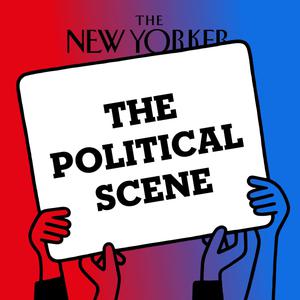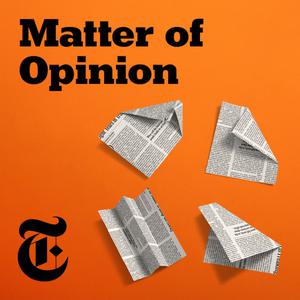
The Political Scene | The New Yorker
WNYC Studios and The New Yorker
The Political Scene | The New Yorker
- 42 minutes 2 secondsTrump’s “Bonkers” Immunity Claim, with Neal Katyal
The Washington Roundtable: Susan B. Glasser, Jane Mayer, and Evan Osnos discuss Donald Trump’s argument for Presidential immunity with former acting U.S. Solicitor General Neal Katyal. Will the Supreme Court deliver Trump a legal victory in his fight against prosecution by the Justice Department ahead of the November election?
This week’s reading:
- “King Donald’s Day at the Supreme Court,” by Susan B. Glasser
- “What Harvey Weinstein’s Overturned Conviction Means for Donald Trump’s Trial,” by Ronan Farrow
- “Donald Trump Is Being Ritually Humiliated in Court,” by Eric Lach
- “The G.O.P.’s Election-Integrity Trap,” by Antonia Hitchens
To discover more podcasts from The New Yorker, visit newyorker.com/podcasts. To send in feedback on this episode, write to [email protected] with “The Political Scene” in the subject line.
27 April 2024, 12:55 am - 36 minutes 40 secondsA Student Journalist Explains the Protests at Yale
Anika Arora Seth, the editor-in-chief and president of the Yale Daily News, joins Tyler Foggatt to share what it has been like covering campus protests since Hamas attacked Israel on October 7th. Seth explains both the global and university-specific forces at play that led to the arrest of forty-seven protesters on Yale’s campus this week, and lays out how the university has responded to concerns over students’ safety during the protests.
To discover more podcasts from The New Yorker, visit newyorker.com/podcasts. To send feedback on this episode, write to [email protected].
24 April 2024, 10:00 am - 28 minutes 2 secondsJonathan Haidt on “The Anxious Generation”
Both anecdotally and in research, anxiety and depression among young people—often associated with self-harm—have risen sharply over the last decade. There seems little doubt that Gen Z is suffering in real ways. But there is not a consensus on the cause or causes, nor how to address them. The social psychologist Jonathan Haidt believes that enough evidence has accumulated to convict a suspect. Smartphones and social media, Haidt says, have caused a “great rewiring” in those born after 1995. The argument has hit a nerve: his new book, “The Anxious Generation,” was No. 1 on the New York *Times* hardcover nonfiction best-seller list. Speaking with David Remnick, Haidt is quick to differentiate social-media apps—with their constant stream of notifications, and their emphasis on performance—from technology writ large; mental health was not affected, he says, for millennials, who grew up earlier in the evolution of the Internet. Haidt, who earlier wrote about an excessive emphasis on safety in the book “The Coddling of the American Mind,” feels that our priorities when it comes to child safety are exactly wrong. “We’re overprotecting in [the real world], and I’m saying, lighten up, let your kids out! And we’re underprotecting in another, and I’m saying, don’t let your kids spend nine hours a day on the Internet talking with strange men. It’s just not a good idea.” To social scientists who have asserted that the evidence Haidt marshals does not prove a causative link between social media and depression, “I keep asking for alternative theories,” he says. “You don’t think it’s the smartphones and social media—what is it? . . . You can give me whatever theory you want about trends in American society, but nobody can explain why it happened so suddenly in 2012 and 2013—not just here but in Canada, the U.K., Australia, New Zealand, Northern Europe. I’m waiting,” he adds sarcastically, “for someone to find a chemical.” The good news, Haidt says, is there are achievable ways to limit the harm.
Note: In his conversation with David Remnick, Jonathan Haidt misstated some information about a working paper that studies unhappiness across nations. The authors are David G. Blanchflower, Alex Bryson, and Xiaowei Xu, and it includes data on thirty-four countries.
22 April 2024, 10:00 am - 40 minutes 52 secondsThe Morality Play Inside Trump’s Courtroom
The Washington Roundtable: Susan B. Glasser, Jane Mayer, and Evan Osnos talk with the NPR reporter Andrea Bernstein about what has happened inside the courthouse during Donald Trump’s first week on trial. Plus, how the historic trial may factor into the 2024 race and whether President Biden should be talking about it on the campaign trail.
“This idea of the old ‘Teflon Don’ is just finished,” Evan Osnos says. “The guy is now a creature of the court.”
This week’s reading:
- “Donald Trump’s Trial of the Century,” by Eric Lach
- “The Supreme Court Asks What Enron Has to Do with January 6th—and Trump,” by Amy Davidson Sorkin
- “Biden Is the Most Pro-Labor President Since F.D.R. Will It Matter in November?,” by Eyal Press
- “Did Mike Johnson Just Get Religion on Ukraine?,” by Susan B. Glasser
To discover more podcasts from The New Yorker, visit newyorker.com/podcasts. To send feedback on this episode, write to [email protected] with “The Political Scene” in the subject line.
20 April 2024, 1:30 am - 34 minutes 46 secondsRonan Farrow on the Scheme at the Heart of Trump’s New York Trial
Ronan Farrow, a Pulitzer Prize-winning investigative reporter and contributing writer to The New Yorker, joins Tyler Foggatt to discuss the impact of rulings made this week by Judge Juan Merchan in Donald Trump’s criminal trial in New York, where he faces thirty-four felony counts for falsifying business records related to hush-money payments made to adult-film star Stormy Daniels around the time of the 2016 election. Farrow explains why two other hush-money payments, made to former Trump Tower doorman Dino Sajudin and former Playboy model Karen McDougal, are central to the Manhattan District Attorney’s case. As Farrow explains, “the coverup is ultimately a much, much bigger story than any of the underlying things being covered up would have been.”
This week’s reading:
- Inside the Hush-Money Payments That May Decide Trump’s Legal Fate, by Ronan Farrow
- The National Enquirer, a Trump Rumor, and Another Secret Payment to Buy Silence, by Ronan Farrow
- Donald Trump, a Playboy Model, and a System for Concealing Infidelity, by Ronan Farrow
To discover more podcasts from The New Yorker, visit newyorker.com/podcasts. To send feedback on this episode, write to [email protected].
17 April 2024, 10:00 am - 18 minutes 11 secondsA Bipartisan Effort to Carve out Exemptions to Texas’s Abortion Ban
Texas has multiple abortion laws, with both criminal and civil penalties for providers. They contain language that may allow for exceptions to save the life or “major bodily function” of a pregnant patient, but many doctors have been reluctant to even try interpreting these laws; at least one pregnant woman has been denied cancer treatment. The reporter Stephania Taladrid tells David Remnick about how two lawmakers worked together in a rare bipartisan effort to clarify the limited medical circumstances in which abortion is allowed. “If lawmakers created specific exemptions,” Taladrid explains, “then doctors who got sued could show that the treatment that they had offered their patients was compliant with the language of the law.” Taladrid spoke with the state representatives Ann Johnson, a Democrat, and Bryan Hughes, a conservative Republican, about their unlikely collaboration. Johnson told her that she put together a list of thirteen conditions that might qualify for a special exemption, but only two of them—premature ruptures and ectopic pregnancy—were cited in the final bill. Still, the unusual bipartisan action is cause for hope among reproductive-rights advocates that some of the extreme climate around abortion bans may be lessening.
15 April 2024, 10:00 am - 39 minutes 3 secondsWill an 1864 Abortion Law Doom Trump in Arizona?
The Washington Roundtable: Susan B. Glasser, Jane Mayer, and Evan Osnos discuss the revival of Arizona’s hundred-and-sixty-year-old abortion ban, what role the issue of reproductive freedom will play in the November election, and how the position of reproductive health care in politics has evolved over the decades.
This week’s reading:
- “Donald Trump Did This,” by Susan B. Glasser
- “The Fight to Restore Abortion Rights in Texas,” by Stephania Taladrid
To discover more podcasts from The New Yorker, visit newyorker.com/podcasts. To send feedback on this episode, write to [email protected] with “The Political Scene” in the subject line.
13 April 2024, 2:30 am - 14 minutes 38 secondsFrom WIRED Politics Lab: How Election Deniers Are Weaponizing Tech To Disrupt November
Election deniers are mobilizing their supporters and rolling out new tech to disrupt the November election. These groups are already organizing on hyperlocal levels, and learning to monitor polling places, target election officials, and challenge voter rolls. And though their work was once fringe, its become mainstreamed in the Republican Party. Today on WIRED Politics Lab, we focus on what these groups are doing, and what this means for voters and the election workers already facing threats and harassment.
Listen to and follow WIRED Politics Lab here.
Be sure to subscribe to the WIRED Politics Lab newsletter here.11 April 2024, 9:00 pm - 30 minutes 51 secondsWhat to Expect from Trump’s First Criminal Trial
The New Yorker staff writer Eric Lach joins Tyler Foggatt to provide a preview of Donald Trump’s first criminal trial, which begins next week in Manhattan. Trump faces thirty-four felony counts for falsifying business records related to hush-money payments made to the adult-film star Stormy Daniels in 2016. Lach and Foggatt discuss the features of the controversial case and what six straight weeks of court appearances could mean for Trump’s campaign.
To discover more podcasts from The New Yorker, visit newyorker.com/podcasts. To send feedback on this episode, write to [email protected].
10 April 2024, 11:00 am - 36 minutesThe Attack on Black History in Schools
Across much of the country, Republican officials are reaching into K-12 classrooms and universities alike to exert control over what can be taught. In Florida, Texas, and many other states, laws now restrict teaching historical facts about race and racism. Book challenges and bans are surging. Public universities are seeing political meddling in the tenure process. Advocates of these measures say, in effect, that education must emphasize only the positive aspects of American history. Nikole Hannah-Jones, the New York Times Magazine reporter who developed the 1619 Project, and Jelani Cobb, the dean of the Columbia University School of Journalism, talk with David Remnick about the changing climate for intellectual freedom. “I just think it’s rich,” Hannah-Jones says, “that the people who say they are opposing indoctrination are in fact saying that curricula must be patriotic.” She adds, “You don’t ban books, you don’t ban curriculum, you don’t ban the teaching of ideas, just to do it. You do it to control what we are able to understand and think about and imagine for our society.”
8 April 2024, 10:00 am - 36 minutes 43 secondsAfter the World Central Kitchen Attack, How Far Will Biden Shift on Israel?
The Washington Roundtable: Susan B. Glasser, Jane Mayer, and Evan Osnos discuss how the Israeli strike on World Central Kitchen workers in Gaza could factor into a policy shift by the Biden Administration on Israel and the war. President Biden realized that he needed to “catch up to where the country was,” Osnos says. Then the British barrister Philippe Sands, a prominent specialist in international law who represents the state of Palestine in the case against the Israeli occupation before the International Court of Justice, joins the group to discuss whether the laws of war have been violated in this conflict.
This week’s reading:
- “Donald Trump’s Amnesia Advantage,” by Susan B. Glasser
- “Biden’s Increasingly Contradictory Israel Policy,” by Isaac Chotiner
- “What It Takes to Give Palestinians a Voice,” by Robin Wright
To discover more podcasts from The New Yorker, visit newyorker.com/podcasts. To send feedback on this episode, write to [email protected] with “The Political Scene” in the subject line.
5 April 2024, 10:00 am - More Episodes? Get the App
Your feedback is valuable to us. Should you encounter any bugs, glitches, lack of functionality or other problems, please email us on [email protected] or join Moon.FM Telegram Group where you can talk directly to the dev team who are happy to answer any queries.
 The New Yorker Radio Hour
The New Yorker Radio Hour
 Radio Atlantic
Radio Atlantic
 Matter of Opinion
Matter of Opinion
 The Ezra Klein Show
The Ezra Klein Show
 Political Gabfest
Political Gabfest
 On the Media
On the Media